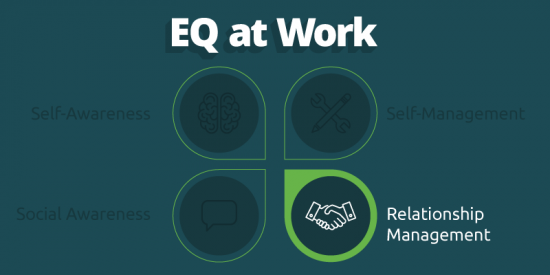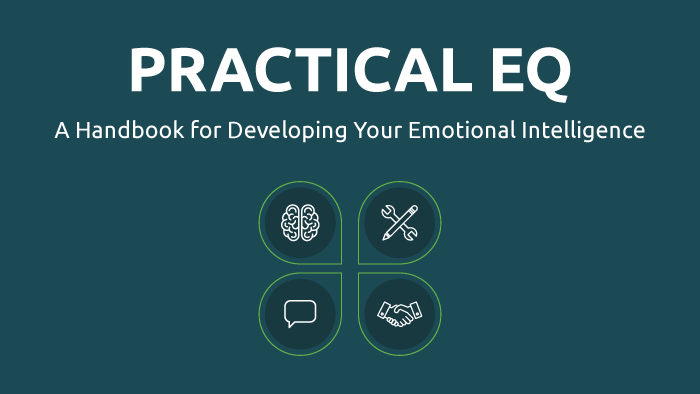This article is part four of our EQ at Work series – be sure to check out parts one, two, and three on self-awareness, self-management, and social awareness!
The Culmination of EQ in the Workplace
The three emotional intelligence (EQ) domains we’ve discussed so far in the EQ at Work series covered how to gain greater emotional awareness on personal and social levels, and how individuals can better manage how they respond to their own emotions.
The last EQ domain that author Daniel Goleman identified is relationship management, and this is where those first three domains all converge. When your employees can work on improving their own emotional awareness and management, it follows that they’ll be able to see greater health and influence in their relationships.
Goleman says the competencies involved in managing relationships include:
- Developing others
- Inspirational leadership
- Change catalyst
- Influence
- Conflict management
- Teamwork and collaboration
These competencies are often viewed as leadership skills, but they are relevant outside of “leader/follower” relationships, too.
For example, “inspirational leadership” could apply to how you inspire and motivate a family member, a friend, or a peer at work. “Change catalyst” could apply when you find a better way to work or a technology to use and need to get your peers or managers on board.
Your employees need to understand how they can influence positive connection and teamwork in each of their personal and professional relationships. Managing the health of relationships is a lifelong effort that pays huge dividends in the fulfillment people find at home and at work.
An easy way to help employees improve in each of these areas and the other aspects of EQ is using microlearning videos. When these skills are presented in short bursts, it helps people to better absorb the information and apply it on the job. Our content library is full of microlearning content to help break down relationship building in the workplace and other emotional intelligence content. You can browse our a preview of our training library here.
Emotional intelligence isn’t just for individual contributors – in fact, emotional intelligence is one of the most valuable skills a leader can have in the workplace! Learn more about how emotional intelligence can impact leaders, workplace culture, and more in our webinar on the high EQ leader.
Where Relationships Diverge at Work
Relationship management is more involved than simply having relationships – it requires taking intentional steps to ensure they’re healthy and beneficial to both parties.
Dysfunctions in the workplace often stem from the assumption of ill will running rampant among colleagues and teams. This creates a mindset of people being simply something you have to deal with, rather than interact with, or even enjoy!
One of the most toxic ways that poor relationship management manifests at work is through gossip. Talking about others behind their backs is common practice in most workplaces today, but its killing collaboration and culture.
Creating a secure, supportive, and compassionate work environment may not sound like typical ambitions for business leaders, but building this type of culture is what improves creativity, collaboration, and productivity. This is how you gain and retain talented, purposeful people.
Helping your employees to focus on building relationships in the workplace effectively can take weight off some major challenges, like employee engagement and retention, productivity, and developing leaders.
So, rather than letting poor relationship habits rule the workplace, let’s talk about strategies your employees can focus on to improve their relationships.
How Employees Can Practice Relationship Management Skills
There are a lot of ways to impact the health of relationships, but these are some fundamentals that many people either never learn, or they forget over time:
Reviving the Art of Conversation
Today’s technology has made it much easier to communicate with whoever we want, wherever they are, whenever the time. Despite this massive increase in connectivity, the screens between us are often a barrier to conversing in ways that result in genuine connection and understanding.
It seems conversation may be becoming a lost art. We can revive that art again by recognizing and practicing the conversation habits that strengthen relationships. NPR radio host Celeste Headlee offered ten tips in a TEDx Talk that we can all benefit from learning:
Setting and Respecting Boundaries
Many people struggle with either not setting boundaries for themselves, or not respecting others’ boundaries. This is an important aspect of maintaining emotional health and steering clear of bitterness.
Setting boundaries starts with self-awareness, but once they’re identified, they have to be made known to others and enforced. For example, if an employee is constantly feeling pressure to work overtime to please their boss, and they’re missing family events because of it, they need to go over some expectations with their boss so they have the ability to say “no” when they need to.
Sometimes teamwork means saying yes to helping others, but sometimes it means respectfully saying no – boundaries like this help people to “work from a place of integrity” as author and researcher Brené Brown describes it.
When employees don’t feel taken advantage of because their boundaries are known and respected, they can be a much more valuable member of the team.
Assuming Goodwill in Others’ Intentions
Many organizations want their employees to work from the mindset of assuming the best in others’ intentions. This mindset is more natural for some than others, but we all struggle with choosing to see the positive intention behind others’ behaviors when those behaviors result in us being hurt or taken advantage of. That’s why those boundaries we just talked about are an important factor in relationships – boundaries protect us from bitterness and help us to see the best in others.
Assuming goodwill in others’ intentions can be tough to keep as a habit, but it’s absolutely worth it to nurture that mindset. When we pause our reactions to focus on a generous view of someone else’s words or behaviors, we become much better at addressing the situation in a helpful way, rather than a hurtful way.
When you consciously choose to assume others’ positive intentions, you’re able to offer constructive feedback when issues arise. By doing this, you’re not ignoring the problem and you’re not attacking them – that’s how strong, trusting relationships are built.
If you’re seeing your employees struggling to collaborate, people talking behind each other’s backs, or a lack of connection and trust among team members, look at how you can help develop their relationship management know-how. To assist you with that, we have a free guide that goes over these practical strategies for employees – check it out below.
To help your employees develop EQ, check out our free handbook with simple practices and reflection questions:
Read part one: EQ at Work: Developing Employees’ Self-Awareness
Read part two: EQ at Work: Self-Management Skills for Your Employees
Read part three: EQ at Work: Amplify Empathy for Higher Social Awareness

